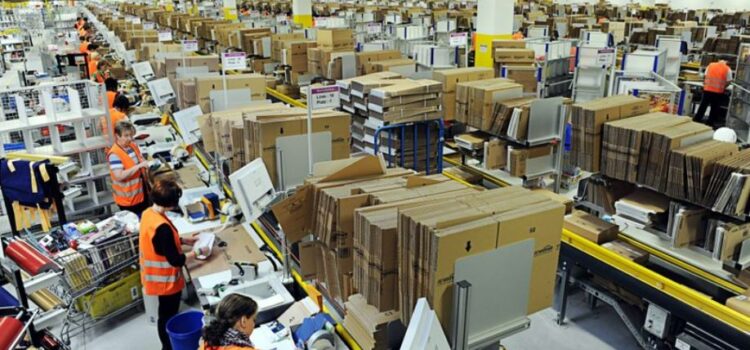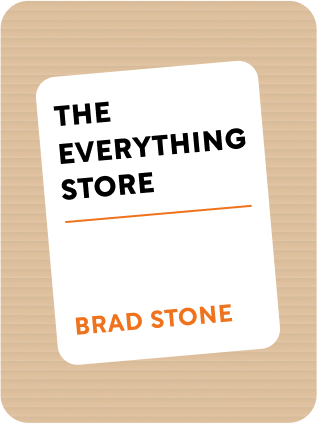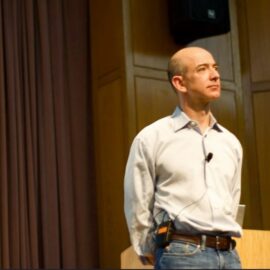

This article is an excerpt from the Shortform book guide to "The Everything Store" by Brad Stone. Shortform has the world's best summaries and analyses of books you should be reading.
Like this article? Sign up for a free trial here .
What are Amazon’s core values? How does Bezos instill these values in his team?
There are a few core values that Jeff Bezos tries to emphasize to his team. Some of these values include long-term ambitions, the ability to dive deep, and their competitive retailing strategies.
Continue reading for more information on Amazon’s core values.
Amazon Company Values
Throughout the historical narrative, The Everything Store discusses the Amazon core values that Jeff Bezos tirelessly emphasizes. We’ve compiled the most important company values here, with representative quotes and anecdotes illustrating the value in action.
Huge Long-Term Ambitions
Bezos and Amazon are known for thinking huge and having galaxy-sized ambition. They then execute it with dogged determination and boldness.
“Thinking small is a self-fulfilling prophecy. [In contrast,] leaders create and communicate a bold direction that inspires results. They think differently and look around corners for ways to serve customers.”
- From initiation, Bezos imagined an Everything Store where the entire Earth’s catalogue was accessible to anyone.
- When hiring Walmart distribution exec Jimmy Wright in 1998, Bezos wanted a distribution system 10x larger than it currently was, not just in the US but also the UK and Germany. He wanted a system that “will handle everything but an aircraft carrier.”
- In the toy season in 1999, Bezos insists on spending $120 million to stock every toy imaginable. They eventually end with a lot of surplus inventory.
- When building the AWS S3 service, Bezos said, “this has to scale to infinity with no planned downtime. Infinity!”
- Brad Stone: “the future of [Amazon] becomes easy to predict. The answer to almost every conceivable question is yes.” Will Prime become same-day shipping? Yes. Will Amazon one day run its own delivery? Yes.
- “We are genuinely customer-centric, we are genuinely long-term oriented and we genuinely like to invent. Most companies are not those things. They are focused on the competitor, rather than the customer. They want to work on things that will pay dividends in two or three years, and if they don’t work in two or three years they will move on to something else. And they prefer to be close-followers rather than inventors, because it’s safer. That is why we are different. Very few companies have all of those three elements.”
Boldness
- Bezos: “Physically, I’m a chicken. Mentally, I’m bold.”
- In its first letter to shareholders: “We will make bold rather than timid investment decisions.”
- To eBay and Amazon board member Cook: “We’re going to win, so you probably want to consider whether to stay on the eBay board.”
Speed
- “Speed matters in business. Many decisions and actions are reversible and do not need extensive study. We value calculated risk taking.”
- During the IPO process, Bezos wasn’t allowed to speak to press for 7 weeks. “I can’t believe we have to delay our business by seven years,” magnifying the calendar time by the speed of Internet evolution.
- In 1999, when accounting worried about Amazon’s profitability, Bezos insisted on customer experience and was skeptical of profitability projections. “If you are planning for more than twenty minutes ahead in this kind of environment, you are wasting your time.”
- When developing the Kindle e-reader, Kessel asks Bezos what the deadline for the product would be. Bezos: “You are basically already late.”
Long-term Focus
- Ignoring stock prices. “You don’t feel thirty percent smarter when the stock goes up by thirty percent, so when it goes down you shouldn’t feel thirty percent dumber.”
- The compensation packages spread the signing bonus over 2 years; grant RSUs over 4 years, but 5% at the end of the 1st year, 15% their second year, and 20% every 6 months over the final 2 years. Further grants vest over 2 years and are also backloaded.
- Blue Origin’s motto: Gradatim Ferociter, “step by step, ferociously.” Their coat of arms has tortoises, invoking the story of the tortoise and the hare.
Ability to Dive Deep
Bezos is renowned by his staff for being able to dive into minute details of the business.
“Leaders operate at all levels, stay connected to the details, audit frequently, and are skeptical when metrics and anecdote differ. No task is beneath them.”
- Bezos reportedly has the ability to comment insightfully on topics he has no prior training in.
- In a discussion about algorithms to optimize picker movements, a five-engineer team presented their work over 9 months. Bezos read the paper, said “you’re all wrong,” and started writing on the whiteboard. Said an engineer: “Everything he put down was correct and true.”
- He dove into a distribution problem dealing with batch sizes and packaging, impressing a consulting professor in willing to be there ”with his sleeves rolled up, climbing around the conveyors with all of us.”
- When hiring Udi Manber, an algorithms expert, Bezos asks him to describe a new algorithm he invented. Manber later said: “He not only fully understood it, but did it faster than most people. I did not expect that from a CEO. It would have taken me a month to explain it to most senior Yahoo people.”
- (Shortform note: one of Steve Yegge’s famous posts about Amazon describes Bezos as “so goddamned smart that you have to turn it into a game for him or he’ll be bored and annoyed with you.”
- “For years he’s had armies of people taking care of everything for him. He’s had a general’s view of the industry battlefield for ten years. Not only do you have more time than anyone else, and access to more information than anyone else, you also have this long-term eagle-eye perspective that only a handful of people in the world enjoy. So he’s really, REALLY good at reading presentations.”
- Yegge proposes deleting every 3rd paragraph in your narrative so that Bezos has to fill in the blanks and avoid being bored.)
Retailing Strategy
- Early on, they believed that the larger the company got, the lower the prices it could exact from book distributors, and the more distribution capacity it could afford.
- In their first shareholder letter: “Market leadership can translate directly to higher revenue, higher profitability, greater capital velocity, and correspondingly stronger returns on invested capital.”
- Later in 2001, meeting with Jim Collins, they came up with a renewed virtuous cycle: lower prices leads to more customer visits, leading to more sales, which leads to better returns on fixed costs, which allows further lowering of prices. More customer visits also led to more third-party sellers, which increases selection and thus increases more customers.
Broad selection
- The early advantage of Amazon was its huge catalog of obscure titles that no physical bookstore could possibly stock.
- Bezos wanted to build confidence in customers that Amazon could stock anything they wanted, making Amazon the first place they’d look.
- In 1999 Bezos had aggressive ideas, like the Alexandria Project (get 2 copies of every book ever printed); and Project Fargo (get one of every product ever manufactured and store it in a distribution center).
- When Amazon expanded to toys in 1999, Bezos insisted on stocking every possible toy and spending $120 million. (They end the year with a huge toy surplus.)
Learning from Partners, then Beating Them
- Amazon Marketplace launched to some concerns about competing with third party sellers who might undercut Amazon. However, Bezos understood that if someone else knew how to sell more cheaply than Amazon, Amazon should let them and figure out how they did it. They did this for jewelry, which was a more complicated category than expected.
- Amazon uses pricing bots that crawl competitors’ prices and adjust Amazon’s prices accordingly.
- (Shortform note: Amazon now manufactures its own branded goods like batteries and USB cables, no doubt fueled by its immense dataset on the bestselling, most profitable goods.)
Branding
Bezos recognizes the power of branding and establishing how Amazon is perceived in the customer’s mind.
- Bezos insisted on reporting of the company as Amazon.com
- He saw the IPO as a global branding event.

———End of Preview———
Like what you just read? Read the rest of the world's best book summary and analysis of Brad Stone's "The Everything Store" at Shortform .
Here's what you'll find in our full The Everything Store summary :
- How Amazon went from an online bookstore to the largest internet retailer in the world
- What Jeff Bezos did to compete with companies like eBay, Zappos, and Diapers.com
- What it was like to work for Jeff Bezos






